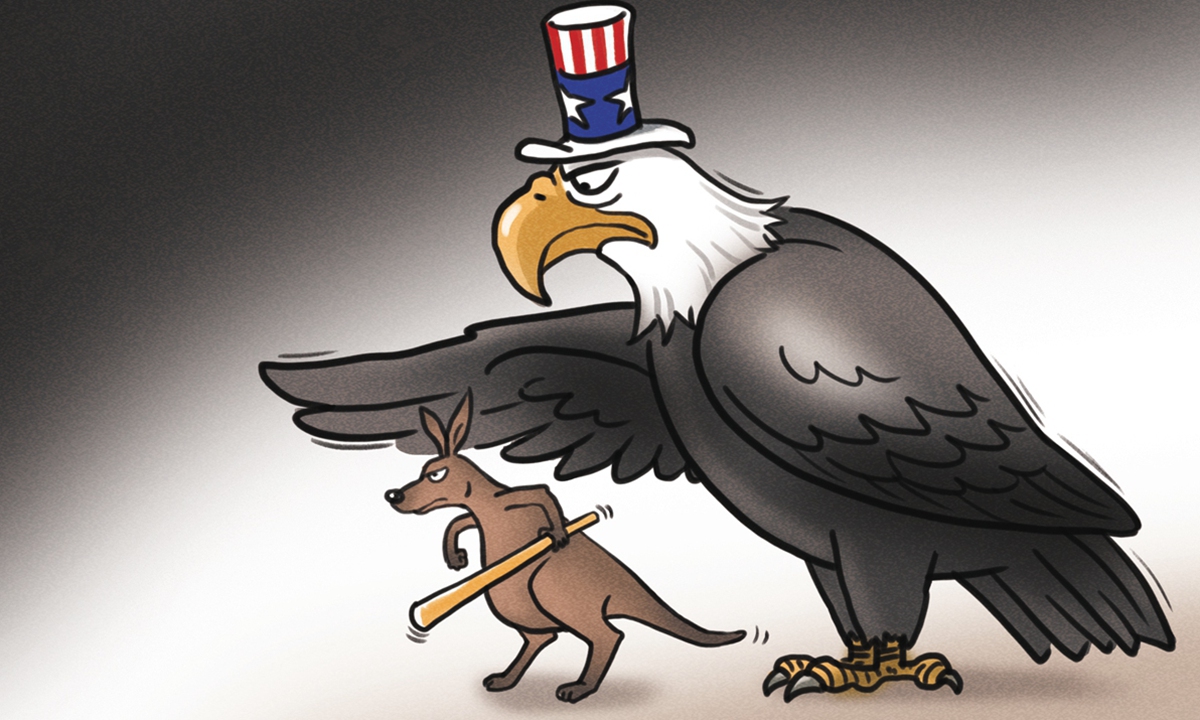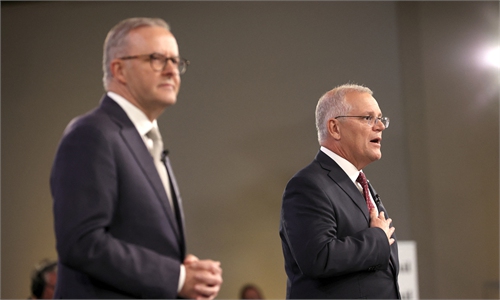Australian defense minister venomous, racially offensive on China’s security pact with Solomon Islands

Illustration: Liu Rui/Global Times
In a recent interview with Melbourne's 3AW radio, Peter Dutton, Australia's defense minister and notorious China hawk, maliciously alleged corruption and bribery in China's recent security cooperation pact with the Solomon Islands. His vicious remarks were not only politically venomous, but also racially offensive when he said, "we don't pay off, we don't bribe people, and the Chinese certainly do." Branded as an incorrigible liar by many of Australia's politicians, Scott Morrison, Australia's prime minister sided with Dutton's rancorous babble as he said Dutton "put it pretty well."
Dutton and Morrison could not produce any evidence for their outrageous defamation of the open and transparent cooperation between China and the Solomon Islands. Their spiteful vilification of China's friendly relationship with the Pacific countries serves their ulterior political purpose. Such defaming is sinisterly manipulated and weaponized in the intense and increasingly vituperative federal election campaign.
The Labor party has portrayed Canberra's Pacific policy as a "failure," trying to reveal to Australian voters the political and diplomatic incompetence of the ruling party, and simultaneously fabricating and hyping the "China threat theory" in a bid to create a tough stance toward China.
As an election ploy, the rhetoric of the opposition party may have been more often than not exaggerated, but "failure" is in fact not off beam. Australia's South Pacific policy per se has been an outright failure. Even though Canberra has repeatedly emphasized it is by far the leading donor to the Pacific island countries, its aid has not aimed to improve the economic growth and wellbeing of the local people, but solely to serve its own strategic interests. Australia has always treated the Pacific island governments and their people in a condescending and sometimes insulting manner, promoting its own ideology and political system by coercive means tinted with colonialism and imperialism, trying to act as South Pacific's "minor hegemon."
By sharp contrast, China has been consistently cooperating with countries in the South Pacific region on the basis of mutual benefit, equality and reciprocity, with no strings attached. The countries in the region have concretely benefited from China's aid programs, the Belt and Road Initiative projects, and other investment and trade activities. China doesn't impose any political conditions or interfere with the local system of governance and diplomatic policies, and it never acts like a bully like the US and Australia.
Washington and Canberra are now desperately attempting to maintain their hegemony and privileges and they have been stuck in a strategic anxiety, which has been revealed in their hysterical responses to China's cooperation with the Solomon Islands. The US first demanded Australia to coax and coerce the Pacific country to step away from the pact with China. Both Australian Prime Minister Scott Morrison and Foreign Minister Marise Payne called their counterparts in Honiara, trying to interfere with the country's diplomatic and policy-making process. Two officials of Australia's top intelligence services then flew to the Solomons, followed in close step by Minister for International Development and the Pacific Zed Seselja, to pile pressure on the Solomon Islands' Prime Minister Manasseh Sogavare. When Canberra's blatant bullying and menacing failed to intimidate Honiara, Washington decided to intervene directly, sending the White House' National Security Council Indo-Pacific Coordinator Kurt Campbell and Assistant Secretary of State for East Asian and Pacific Affairs Daniel Kritenbrink to the country. It's clear that the US' hegemony across the world, including in the South Pacific, is waning. The era of colonialism and white supremacy is already a disgrace in history, and it is simply in vain for countries like the US and Australia to impose their self-interest and geopolitical strategy on smaller countries.
The "Indo-Pacific Strategy" promoted by the US is aimed to contain China's development, and China's cooperation with countries in the South Pacific has come into the crosshairs. The US, assisted by its local proxy Australia, has been attempting to assemble a small anti-China clique in the region as a way to serve its own interests and goals.
The politicization and demonization of China's relations with the Pacific countries by the US and Australia will threaten the stability and prosperity of the Pacific. Countries such as the Solomon Islands are sensibly aware of their ulterior motives, and try to uphold their sovereignty and self-determination. That is why Morrison's awkward tactics in the region have proved to be a complete failure, his Pacific "Step-up" strategy is in fact a "stuff up," as described by his contesting Labor opponent Albanese.
The author is president of the Chinese Association of Australian Studies and director of the Australian Studies Centre at the East China Normal University. opinion@globaltimes.com.cn

